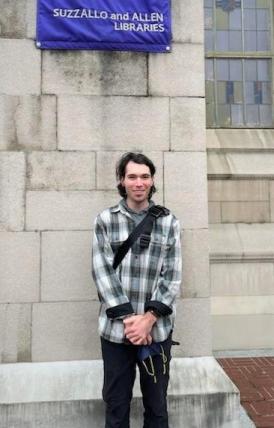This fall, English Matters has directed attention to how our department interacts with STEM disciplines. Most of what has been covered concerns institutional initiatives and curricular design. While it is interesting to survey the forest of departmental interconnectedness, it is perhaps most important to understand how cross-campus learning opportunities benefit our undergraduate students as individuals. As such, we’re honored to introduce Zachary Datko, a declared Pre-Med student at the UW who is majoring in English. Like many of our students (and alumni, and English department faculty and staff for that matter) Zachary’s pathway to a career up until this point has been a bit less than ruler straight. There have been fits and starts, interspersed with many interesting and rich life experiences. A few years more seasoned than the average fresh-out-of-high school dorm denizen, Datko reflects on the value of language study and communication to a career in health care.
Good morning Zachary! Please relate a bit about your educational journey up to this point. Where do you aspire to go? Where have you come from?
I was 28 years old when I enrolled in UW’s English Department to pursue a career in healthcare. My journey in higher education started at Drexel University in 2009, ending with an unfinished Architectural Engineering degree. I took up an interest in whitewater rafting, started guiding trips and worked up to operations manager at the Olympic Whitewater Park in Oklahoma City. Being an operations manager was rewarding, but I felt helpless when injured people needed real professional assistance. I remember the day a terrified woman explained to me that she couldn’t move her legs. I felt helpless. But the paramedics on sight commanded the situation, which stuck with me. Ever since that day I have never doubted that healthcare is where I belong.
Your career aspirations in medicine require a lot of scientific and technical training. In what ways do you see the English major contributing to your goal of providing high-quality medical care?
A Bachelor of Art in English is the scaffolding of what makes a high-quality physician. English teaches students higher-order skills in language and communication. Communication is at the core of a strong physician. Physicians are not only responsible for communicating technical medical information to patients in ways they can understand, but also need to “read” what patients relate about their experiences and conditions. At the heart of a physician is an accurate understanding of science, but that understanding is meaningless if it can’t be explained to people who are not enveloped in the world of healthcare.
How have you been supporting your education? How would more funding make a difference in your life?
For the past two years I have attended school full-time and worked full-time. I work in a hospital to be immersed in what I would like to do professionally, to see it from an inside perspective. I spent about six months in an acute psych setting and currently work in neuro-telemetry. I love the work, but more funding would allow me to focus more on school. Practically, because the hospital understandably needs to rigidly schedule staff hours, it is often difficult to enroll in the classes best suited to my ambitions. With a little more funding I could have a more manageable work-to-school ratio, study harder at the classes I really want to take, and graduate sooner.
Care to give a shout out to any of our outstanding English faculty who’ve guided, impressed, fascinated, or otherwise helped you to become your best self?
After declaring my English major and Pre-Med status at the University of Washington, my first English course was “The Study of the English Language and its Diversity” taught by Nancy Bou Ayash. As we worked through the quarter, Professor Bou Ayash met with me and encouraged my ideas. She gave me the confidence to explore a project about communication practices in a hospital setting. At the end of the class Dr. Bou Ayash went out of her way to recommend a book to me about language and healthcare that I found very helpful. As a Pre-Med, I feel like the English major was a smart choice.
